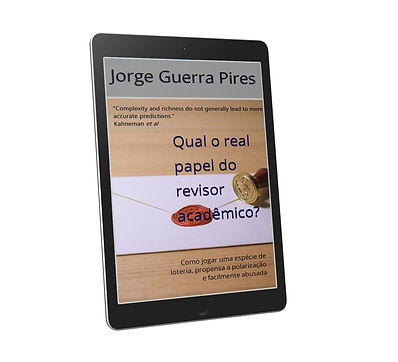

What is the real role of the academic reviewer?: How to play a kind of lottery, prone to polarization and easily abused
"We (Mr. Rosen and I) had sent you our manuscript for publication and had not authorized you to show it to specialists before it is printed. I see no reason to address the – in any case erroneous – comments of your anonymous expert. On the basis of this incident I prefer to publish the paper elsewhere." Einstein nervous about peer publishing!
About
“Peer review can make or break careers.”
Research, peer publishing and Publish or Perish (POP) can be said to have become one body. I don't know of any university that uses publications other than peers to validate the careers of researchers; one can assume that researcher and competence rhyme with peer publishing. This means that all the complexity of intellectual production is summarized in the current model prevailing in peer-reviewed publications.
In this work, we are going to talk about peer publishing, drawing on the author's experience as a reviewer and author, in addition to some works present in the literature on the subject.
Hypotheses defended in the book
Hypothesis #1: The peer review process of scientific articles is predominantly a decision-making process.
Hypothesis #2: Automation can speed up the process, without reducing quality, and reducing costs and human noise in the decision process.
Hypothesis #3: Algorithms can outperform human reviewers in trying to predict the success of a scientific article, that is, mechanical predictive judgment is better than clinical predictive judgment.
Hypothesis #4: In a review process, clinical predictive judgment, we have noise and human bias at the end of the decision process.
Hypothesis #5: Online, open, temporally continuous reviews may be a better model than peer review. May the best win, like YouTube™ videos.
pillars of the work
- my experience as an author and academic reviewer;
- Publish or Perish, focused on the book Publish Or Perish: Perceived Benefits Versus Unintended Consequences by Imad A. Moosa
- Human decision-making process, based on Noise: A Flaw in Human Judgment by Cass Sunstein, Daniel Kahneman, and Olivier Sibony;
- Computational intelligence, based on the author's academic background;
- Hate the peer-review process? Einstein did too, Andre Spicer, Thomas Roulet;
The book is built on the pillar that the peer review process is just another decision process, so using the theory from the book Noise: A Flaw in Human Judgment.
Although this book is not a peer-reviewed publication, I have endeavored to be careful, citing other works in addition to the aforementioned pillars.
=
Possible contribution to the literature
This book sees peer publishing as a decision-making process. This is different than the works the author has read see. However, this way of looking at the issue created the possibility of joining the work of Daniel Kahneman with other works around POP. This means that this work, in addition to talking about an increasingly important subject for scientific research, also brings this reflection as an innovation: how decision theory can help to understand and improve the decision-making process in the context of accepting scientific articles .
It also proposes and reflects on the possibility of automating the review system for scientific articles. Results show that even simple algorithms can help in the automated academic review process.
=
Potential target audience
-
Early career researchers, wanting to know more about the process of accepting scientific articles, behind the scenes;
-
Researchers going through this nightmare, and I'd like an intellectual hug;
-
Bureaucrats with a guilty conscience;
-
Experienced researchers with hearts still working;
"We (Mr. Rosen and I) had sent you our manuscript for publication and had not authorized you to show it to specialists before it is printed. I see no reason to address the – in any case erroneous – comments of your anonymous expert. On the basis of this incident I prefer to publish the paper elsewhere." Einstein nervous about peer publishing!

blog
 |  |  |
|---|---|---|
 |  |  |
 |  |
Fale com o ebook
Usando inteligência artificial contra a sua inércia cognitiva
Assistente Virtual
Dica. Estou usando uma inteligência artificial bem avançada, pergunte como se estivesse falando com humanos! Faça uma pergunta genérica, e depois vai se aprofundando, como se faz com uma pessoa real.
Alternativa: leia o livro .
Resposta aqui




































